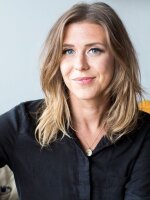For today's Sense of Place dispatch, we're sitting on the grassy banks near the Lachine Canal in Montreal. It's a gorgeous day in the city, people are riding their bicycles, and all you can hear is the faint hum of cicadas. This is where Pierre Kwenders lives.
"I just like this area," he says. "I've been living here for almost 3 years now, and it's so peaceful. Very family vibe. You don't feel like you're in Montreal."
The serenity of Lachine is worlds away from Kwenders' nights. After hours, Kwenders is DJing all over Montreal and across the globe. Along with his friend and manager Hervé Kalongo, Kwenders has also founded Moonshine, an artist collective that celebrates modern African dance music.
In 2022, Kwenders won the Polaris Music Prize for his album, José Louis and the Paradox of Love. This year, he released his latest EP, Tears on the Dancefloor.
Born in the Democratic Republic of Congo, Kwenders has helped carve out a unique space in Montreal for artists and fans of the dance music of the African diaspora. Moonshine has been profiled by Vogue, BET and The New Yorker.
Today on World Cafe, Kwenders shares his journey so far, from his childhood in Kinshasa to coming of age in Montreal. Plus, he talks about the power of language in his music — he sings in Lingala, Tshiluba, English, French and "a little Portuguese."
Interview Highlights
On singing in Tshiluba
"I love Tshiluba because it's the language of my grandfather. Actually, Pierre Kwenders is the name of my grandfather. I wasn't born Pierre Kwenders, but I took my grandfather's name as an homage but also to represent my family and my country as well."
On the impact of Congolese rumba musician Papa Wemba
"Papa Wemba was really the one who helped Congolese rumba to cross over and meet other genres. Meet hip-hop, for example. He was the first Congolese artist who had a rapper in a Congolese rumba song. That song was 'Sai Sai.' I was very young back then, but I remember watching that video. He looks so fly, dressing very hip-hop style. You have this young rapper that comes in later in the song. Seeing those worlds mixing together was amazing."
On how his house parties became the impetus to start Moonshine
"We were so surprised by the reaction. We were expecting 100 people, and we ended up having 300 people. At 1 a.m., we didn't have any more alcohol to sell. There was so many people. It took us by surprise, and we realized that there was a need for it. People wanted that. People just wanted to feel free and come as they are. That was the idea. Bringing all these sounds — Afro-centric sounds — and finding a safe space for it."
On Montreal's proposed noise ordinances
"There's this thing called choice. I feel like some people don't know how to use it properly, and they choose to go live in an area that they know might be noisy. Then they start complaining and it kills business. It's not great for nightlife...
"Now, we have to pay $10,000 fines for noise complaints. That just don't make sense because people need that distraction. We've seen how hard it was for people to go through the pandemic. People started dancing inside, which was great. But instead of dancing inside, we'd rather go outside and dance with a lot of people and see other people and enjoy ourselves together. That's the best thing to do, in my opinion."
This episode of World Cafe was produced and edited by Miguel Perez. Our senior producer is Kimberly Junod and our engineer is Chris Williams. Our programming and booking coordinator is Chelsea Johnson and our line producer is Will Loftus.
Copyright 2025 XPN









